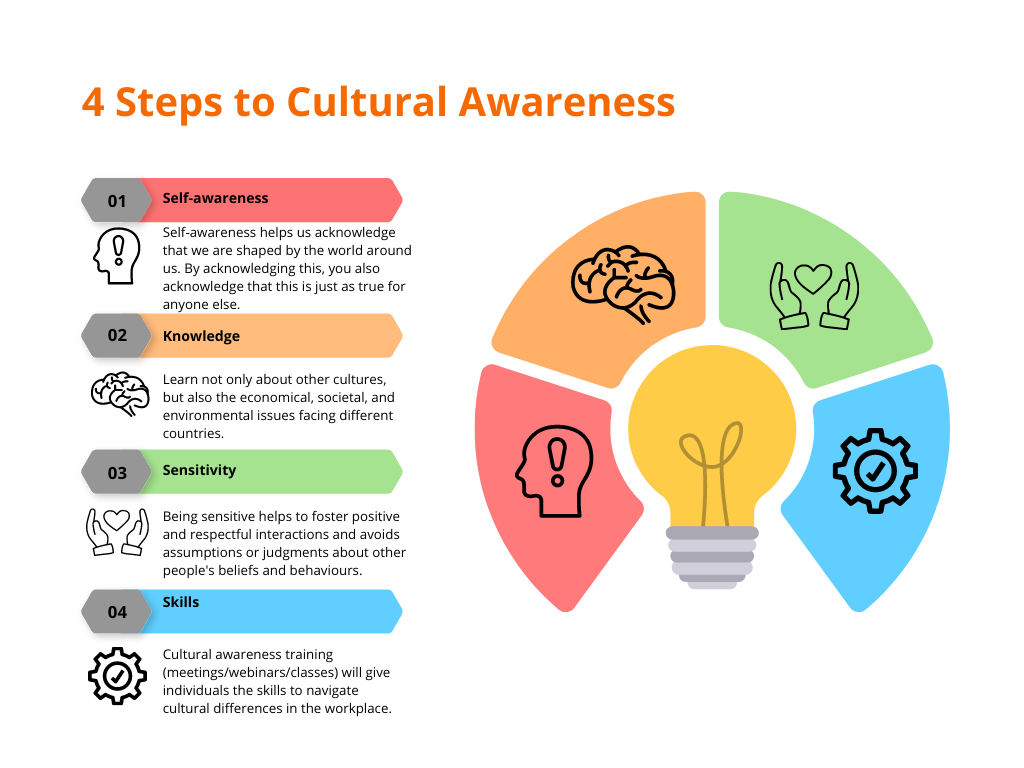Cultural sensitivity
in international employment
Cultural sensitivity is a critical success factor when employing across borders, and a lack of it can cause your business and employees harm. Sometimes, serious harm.
Cultural sensitivity, also referred to as cultural awareness, is the knowledge, awareness, and acceptance of cultural differences. A culturally sensitive person can acknowledge the morals, standards, and principles that differ from their own without prejudice or judgment.
At Gibson Watts Global, we want to help employees and employers thrive in fast-paced, diverse, international business environments. As a PEO provider, we fully believe that diversity and global-mindedness should be integral values for every business big and small – especially when your business crosses borders.
When a business goes international, the potential for misunderstanding is far greater. Mentioned hereunder are some answers to the most asked questions about cultural sensitivity in the workplace and tips for building and maintaining it.

Why is cultural sensitivity important in the modern workplace?
The modern workplace is a melting pot of people from all walks of life. It is therefore imperative to understand how to communicate effectively in such a complex and diverse environment. Cultural awareness is an important building block for global fluency, as it enables employees to operate with a higher level of cultural competence and effectiveness in international settings. By bridging these cultural gaps, we become global citizens, opening our world to new people and new opportunities.
What skills are needed to develop cultural sensitivity?
In a business world that is more interconnected than ever, it is vital that you develop the following skills:
- Self-awareness: We often focus on others when discussing cultural awareness, but to develop this skill, you first need to understand yourself. By acknowledging our own cultural backgrounds and experiences, it allows us to gain a more objective understanding of others.
- Global awareness: Alongside self-awareness, developing an awareness of societal, economical, and environmental issues facing different countries will also help your company be better prepared for the global marketplace.
- Willingness to learn: Becoming culturally sensitive starts with education. Having this knowledge and understanding of the variations and similarities of different cultures helps to avoid alienating or offending customers, partners, and colleagues. If you don’t understand something, don’t be afraid to ask questions – when others take a genuine interest in who they are, people feel respected and appreciated.

What are the benefits of understanding different cultures?
- Better communication: One of the most important benefits of cultural awareness in the workplace is that it enables us to communicate with one another more effectively. And this is important considering most conflicts arise at work as a direct result of miscommunication and misunderstanding.
- Stronger relationships: This doesn’t only hold true for your employees. Cultural awareness can ensure stronger relationships with cross-cultural business partners too.
- Creates an inclusive work environment: Fostering an inclusive working environment will allow employees to collaborate and interact more easily, effectively, and respectfully. If people believe they can be their true selves at work, it will undoubtedly boost employee morale and engagement.
- Successful globalisation: The success of your business abroad depends on cultural immersion and cultural understanding to guarantee market integration and development. Having the knowledge, skills, and training to work effectively with people from different backgrounds will also open more doors for your company.
How can you promote cultural awareness when employing abroad?
Here are some practices you can implement to increase it in the workplace:
- Policies: In order to facilitate workplace diversity, it is worth considering creating new policies or amending existing ones system-wide. This should start with recruitment and end with performance evaluations and promotions so that everyone has a chance to succeed. These policies should be designed to contain a range of practices to help workers actively counteract bias or prejudice and establish standards of appropriate and ethical behaviour in the workplace. These policies will be the building blocks of promoting diversity and cultural awareness in your company.
- Training: It is essential that every employee, from front-line staff to CEOs, is aware of what discrimination is. Cultural awareness training will give employees the skills needed to understand, work, and flourish alongside cultures different from their own. This training should be framed in a way that teaches employees how to deal with working in an increasingly diverse global society and economy.
- Religious holidays: Wishing your employees well on their cultural or religious holidays shows them that you value their differences. To go a step further, staff could be offered alternative holiday arrangements for dates that are meaningful to them throughout the year.
How can Gibson Watts Global help?
Doing business abroad can be a minefield, but we are here to help.
Gibson Watts Global and other PEOs have a network of certified HR professionals that provide businesses with expertise on the local labour laws and cultural norms in the countries where they are employing. This can help businesses avoid potential pitfalls and ensure that they are treating their international employees with sensitivity and respect. Additionally, PEOs provide international employees with access to benefits and other support services that are tailored to their specific needs and cultural backgrounds.
Final thoughts
Cultural awareness is an essential skill needed in the 21st-century workplace. If a business and its employees do not prioritise developing this soft skill, your company could find itself struggling to grow and thrive in the global market. In the workplace, cultural awareness facilitates effective and adequate intercultural communication, which is vital when dealing with partners, clients, and suppliers abroad. And by developing a global mindset through experience and training, your business will build cultural bridges and expand into new markets.
Contact a member of the team today to find out more.
